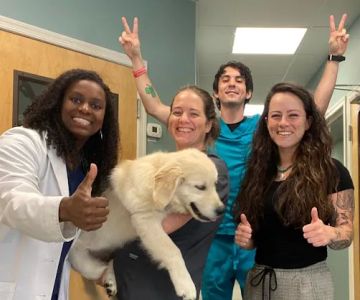What Schools Offer Veterinary Degrees?
For those interested in pursuing a career in veterinary medicine, choosing the right school to earn a veterinary degree is one of the most important decisions you'll ever make. With so many options available, it can be challenging to know which schools stand out in terms of curriculum, facilities, and overall reputation. As someone passionate about animals and eager to pursue a career in animal care, I wanted to dive deeper into the various schools that offer veterinary degrees and what factors should influence your choice. In this article, I will discuss the top veterinary schools, key considerations for choosing the right one, and share my thoughts on what makes a veterinary program exceptional.
1. Top Veterinary Schools in the United States
When it comes to earning a veterinary degree, some schools have earned top rankings due to their quality education, research opportunities, and impressive graduation rates. Let's take a look at some of the top veterinary schools in the U.S.
- University of California, Davis - Often ranked number one in the nation, UC Davis provides an excellent program in veterinary medicine. The school is known for its research opportunities, cutting-edge facilities, and a strong emphasis on public health and clinical practice.
- Cornell University - Located in Ithaca, New York, Cornell’s College of Veterinary Medicine is widely regarded as one of the top programs. The school offers diverse clinical experiences and strong research opportunities, especially in areas like animal welfare and disease prevention.
- Colorado State University - Known for its clinical focus, Colorado State University offers a hands-on approach that allows students to gain real-world experience with animals. The school also emphasizes veterinary specialties like surgery and dermatology.
- University of Pennsylvania - Penn Vet is another prestigious school offering a high-quality veterinary education. It stands out with its emphasis on innovation and leadership in veterinary science and its wide range of research programs.
- Ohio State University - Ohio State’s College of Veterinary Medicine is another top contender, recognized for its modern facilities and its diverse range of veterinary services, including a focus on wildlife medicine and large animal care.
2. Key Factors to Consider When Choosing a Veterinary School
While rankings are important, there are other crucial factors to consider when choosing a veterinary school. Every student has unique needs, so it's essential to research the programs thoroughly to find the best fit for you. Here are a few key things to consider:
- Location - Consider whether you want to study in a rural or urban area, as this can impact your experience and access to certain types of animal care facilities. Urban schools might provide more exposure to exotic animals and small animal practices, while rural schools may offer greater access to farm animals.
- Curriculum and Specializations - Some veterinary schools offer specific programs or specializations, such as research, wildlife medicine, or public health. Make sure the school offers a curriculum that aligns with your career goals.
- Clinical Training Opportunities - Look for schools with strong clinical training programs that offer hands-on experience in animal hospitals or clinics. Practical experience is essential for developing the skills necessary to become a successful veterinarian.
- Tuition and Financial Aid - Veterinary school can be expensive, so it's important to consider the cost of tuition, available scholarships, and other financial aid options.
- Reputation and Accreditation - Accreditation by the American Veterinary Medical Association (AVMA) ensures that the school meets the high standards required for veterinary education. Reputation matters because employers often look for graduates from well-established and recognized programs.
3. The Admissions Process: What Do Veterinary Schools Look For?
The admissions process for veterinary schools is highly competitive, and understanding the requirements is crucial for improving your chances of being accepted. Most schools look for the following:
- Academic Performance - A strong GPA, particularly in science courses like biology, chemistry, and physics, is essential. Some schools also require specific coursework before admission.
- Experience with Animals - Veterinary schools value applicants who have hands-on experience with animals, either through internships, volunteering, or working in animal care facilities. This shows a genuine commitment to the field.
- Letters of Recommendation - Most veterinary schools require multiple letters of recommendation from professors or professionals in the veterinary field. These letters should speak to your passion for animals, work ethic, and potential as a future veterinarian.
- Entrance Exams - Many veterinary schools require standardized tests like the GRE (Graduate Record Examination) or the VCAT (Veterinary College Admission Test). Prepare well in advance to achieve the best scores possible.
4. What Makes a Veterinary Program Stand Out?
Beyond the standard curriculum, some veterinary programs go the extra mile to provide students with unique opportunities that will set them apart in the field. These may include:
- Research Opportunities - Veterinary schools that focus on cutting-edge research provide students with the chance to work alongside faculty members on important scientific studies, contributing to advancements in veterinary medicine.
- State-of-the-Art Facilities - Schools with modern, well-equipped veterinary hospitals give students access to the best resources to practice their skills. Look for schools that offer comprehensive diagnostic labs and treatment facilities.
- Community Outreach Programs - Some schools have partnerships with local communities, shelters, and clinics, providing students with opportunities to offer veterinary care to underserved populations or wildlife, which is a valuable experience for any aspiring vet.
5. Financial Considerations and Scholarships
Vet school is undoubtedly expensive, and knowing your financial options can make a huge difference. Many veterinary schools offer scholarships, financial aid packages, and work-study opportunities to help offset the cost of tuition. Some schools even offer loan forgiveness programs for graduates who work in underserved areas or public health sectors.
Additionally, there are several external organizations that offer scholarships for veterinary students. The American Veterinary Medical Association (AVMA) and the Veterinary Medical Association often provide financial support to students who show promise in the field. It’s essential to research these opportunities to alleviate the financial burden.
6. Conclusion: Choosing the Right Veterinary School
Choosing the right veterinary school is a big decision, but it’s one that should be made with careful consideration. There are many factors to weigh, including the quality of the program, the faculty, available resources, and the overall reputation of the school. By carefully researching each program and understanding what each school has to offer, you can find the perfect fit for your career goals. For more information on veterinary education, visit Hidden Brook Veterinary for valuable resources and guidance as you take the next step in your veterinary career.
SEO Title: What Schools Offer Veterinary Degrees? Find the Best Programs SEO Keywords: veterinary degrees, best veterinary schools, schools offering veterinary degrees, veterinary education, veterinary schools USA SEO Description: Discover top veterinary schools and learn about the factors that make a program stand out. Find out how to choose the best veterinary degree program for your career path.










